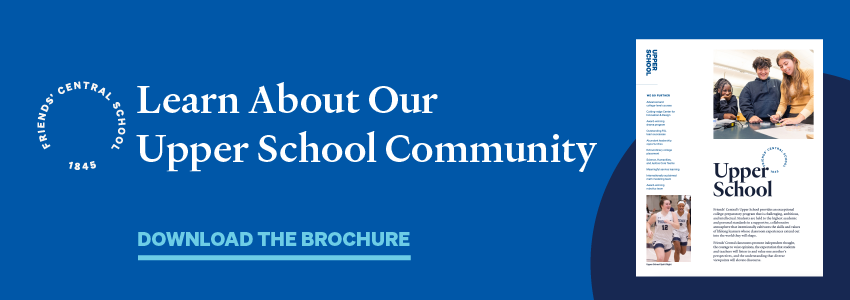High school is a formative time to build lifelong habits of health and wellness. At Friends’ Central, athletics help students stay active, develop teamwork, and build skills that support growth in mind, body, and spirit.
Here are six key ways participating in high school sports can benefit students both on and off the field:

Benefits of High School Sports for Students
1. Physical Health and Wellness
Sports support physical health during a critical stage of development. Students who participate in athletics are more likely to maintain fitness habits and less likely to engage in unhealthy behaviors.
Research consistently shows that participation in sports positively impacts mental health. Regular physical activity is linked to reduced stress, lower rates of anxiety and depression, and improved overall mood. Structured athletics provide student-athletes with an outlet to cope with academic and social pressures while building resilience, focus, and a sense of accomplishment.
Friends’ Central’s Athletics & Wellness program emphasizes a holistic approach, teaching students to make healthy choices, build resilience, and sustain well-being over a lifetime.
2. Leadership and Teamwork Skills
Playing on a team helps students practice communication, empathy, and collaboration. They learn how to motivate others, take responsibility, and support peers. Team experiences reinforce inclusion, creative problem-solving, and mutual respect.
These lessons carry over into the classroom and community, shaping students into confident, compassionate leaders who value cooperation, integrity, and sportsmanship.
3. Mentorship
Coaches play an important role in students’ development, guiding them both on and off the field. A great coach helps students set goals, handle challenges, and celebrate growth.
These relationships show that athletic success is not only about performance, but also about character, perseverance, and how students support one another as teammates and as members of a larger community.
4. Time Management
Balancing academics, practices, and games teaches students how to organize their time and prioritize responsibilities. Student-athletes quickly learn to manage full schedules and stay disciplined about completing their work.
This experience translates directly to success in college and beyond, where time management and balance are essential.
5. Improved Academics
Participation in sports has been linked to stronger academic performance. Student-athletes often develop focus, discipline, and time management skills that carry over into the classroom, supporting higher GPAs and more effective study habits.
At Friends’ Central, many graduates continue their athletic journeys in college, including competitive Division I, II, and III programs, reflecting how sports strengthen both mind and body.
6. Accountability and Responsibility
Sports teach accountability by requiring students to show up prepared, support teammates, and learn from mistakes. Daily practice builds integrity, responsibility, and resilience that extend to all areas of life.
Student-athletes at FCS have the opportunity to participate in the Student-Athlete Advisory Committee (S-AAC), a student-led initiative that gives them a voice in shaping the athletic experience, promoting leadership, and fostering community service across all teams.

Athletics at Friends’ Central
At Friends’ Central, Upper School athletics are a core part of student life and wellness. Our student-athletes benefit from top-tier facilities and fields, offering excellent spaces to train, compete, and excel in every sport. Programs are designed around the School’s mission, Quaker values, and emphasis on integrity and community, highlighting resilience, leadership, and sportsmanship while ensuring student safety and personal development.
From strength and conditioning to NCAA resources, Friends’ Central provides comprehensive support for student-athletes, helping them grow not only as athletes but also as engaged, responsible members of the school community guided by Quaker principles.
Would you like to learn more about athletics at Friends’ Central? Speak with an Admissions counselor, visit our Upper School campus, or download our brochure!


